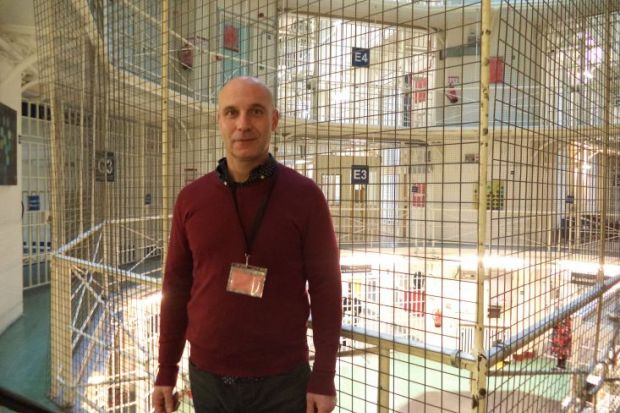At the beginning of this month, a class met to discuss “the implications of having the label ‘ex-offender’”.
The tutors divided the class into three groups. One was required to moderate the debate, while the other two argued for opposed positions: that “the label is detrimental to one’s ability to desist from crime” or, on the contrary, that it “does not really impact on the individual’s ability to successfully desist from crime”. Participants pointed to the fact that convictions put up car insurance fees, that ex-prisoners always get blamed if something gets stolen, that it was easy to fall into an attitude of “Nobody’s going to give me a chance, so what’s the point [of going straight]?” Another banged three books down on a desk and argued that the authors’ careers proved that it was always possible to reinvent oneself.
Yet this was not merely a standard class discussion. It took place in the library at Pentonville Prison, where criminology students from the University of Westminster were taught alongside “inside learners” for whom the questions were of far more than academic interest. This is already highly unusual in the UK prison system. What makes it unique is that one of the tutors who teaches the course, Andy Aresti – a senior lecturer in criminology at Westminster – is himself an ex-convict who has done time in Pentonville.
Dr Aresti was convicted in 1997 of possession with intent to supply Class A drugs and eventually spent nine months in Pentonville and a similar period at an open prison in Kent. Yet even an initial week in Pentonville on remand led him to re-examine his life.
Once out on bail awaiting trial, Dr Aresti recalled, he went to see a therapist, who suggested that he should “do something positive [such as] studying”. He therefore opted for an access course in psychology designed to get mature students into university. Once back in Pentonville, he was supported in this unusual plan by Jane Broadfoot, then the prison’s head of education, who helped him continue on a distance-learning basis, and then allowed him to attend the course in person once he got to the open prison. He was released in August 1998, and began a psychology degree at what is now the University of Roehampton the very next month.
Although he graduated with a first, Dr Aresti admitted that, although “prison is a really horrible place, I was more comfortable in prison than when I went to university. I was out of my comfort zone – among people who were not engaged in crime and hadn’t lived my sort of life.” Nonetheless, he went on to a master’s in cognitive neuropsychology at UCL and then a funded PhD at what is now Birkbeck, University of London, looking at “successful former prisoners who had made dramatic changes in their lives”.
It is precisely because he had himself been “supported by the prison” that Dr Aresti wanted to return to Pentonville to offer prisoners the insights of “convict criminology” – a movement, originating in the US, which draws on the particular perspectives of “ex-con academics”. He and a colleague, Sasha Darke, approached José Aguiar, the current head of education, who had already been thinking along similar lines.
The 10-week course has just been run for the third time on a voluntary basis. Westminster students are selected on the basis of a statement saying why they want to take part, while Mr Aguiar looks for prisoners with a reasonable level of literacy who are “not particularly engaged in activities within the prison and so need some kind of progression”. One told Times Higher Education that, even during his “troubled teens”, he had always had “a different sense of who I really am”. The course had given him “a better understanding of the environment and how things happened”. He had even “adopted” one student as a sort of academic mentor who “gives [him] little prods such as ‘remember your bullet points’”.
As well as offering his students a chance to gain a more than theoretical understanding of prison life, Dr Aresti was delighted that “quite a few [of the inside learners] had said that they want[ed] to pursue degrees. There are also social benefits for them in meeting ‘normal’ people who don’t do crime.”
Plans are now in place to accredit the course, so that it will count towards the Westminster degree but will also provide credits for prisoners who want to go on to foundation courses and, perhaps, into university.
POSTSCRIPT:
Print headline: ‘I was more comfortable in Pentonville than when I went to do my degree’
Register to continue
Why register?
- Registration is free and only takes a moment
- Once registered, you can read 3 articles a month
- Sign up for our newsletter
Subscribe
Or subscribe for unlimited access to:
- Unlimited access to news, views, insights & reviews
- Digital editions
- Digital access to THE’s university and college rankings analysis
Already registered or a current subscriber? Login







